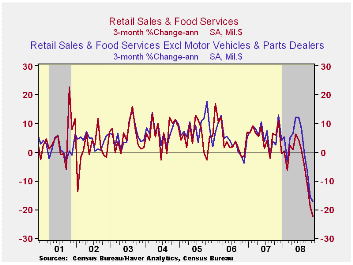 Global| Dec 11 2007
Global| Dec 11 2007Machinery Orders in Japan Grow but Core Orders Still Struggle
Summary
Overall Japan orders are up sharply in October at 18.7% and core orders are up a strong 12.7%. But over three months overall orders are a strong +29.1% while core orders are off at a 14.5% pace. Over the past 12 months core orders are [...]

Overall Japan orders are up sharply in October at 18.7% and
core orders are up a strong 12.7%. But over three months overall orders
are a strong +29.1% while core orders are off at a 14.5% pace. Over the
past 12 months core orders are up by just 3.6%. Since mid-2006 core
orders, those excluding large lumpy projects, are fluctuating around
zero. The foreign/domestic breakdown shows year/year orders strength is
coming from the foreign sector with growth in orders of 19.4% compared
to year/year domestic orders of just 6.6%.
| Japan Machinery Orders | ||||||
|---|---|---|---|---|---|---|
| m/m % | SAAR % | |||||
| SA | Oct-07 | Sep-07 | Aug-07 | 3-Mos | 6-Mos | 12-Mos |
| Total | 18.7% | -14.5% | 7.1% | 39.1% | 14.0% | 11.5% |
| Core Orders* | 12.7% | -7.6% | -7.7% | -14.5% | 13.9% | 3.6% |
| Total Orders | ||||||
| Foreign Demand | 16.0% | -7.8% | 23.0% | 199.4% | 35.6% | 19.4% |
| Domestic demand | 12.1% | -9.6% | -4.2% | -11.2% | 5.3% | 6.6% |
| * Excl ships and electric power | ||||||
Robert Brusca
AuthorMore in Author Profile »Robert A. Brusca is Chief Economist of Fact and Opinion Economics, a consulting firm he founded in Manhattan. He has been an economist on Wall Street for over 25 years. He has visited central banking and large institutional clients in over 30 countries in his career as an economist. Mr. Brusca was a Divisional Research Chief at the Federal Reserve Bank of NY (Chief of the International Financial markets Division), a Fed Watcher at Irving Trust and Chief Economist at Nikko Securities International. He is widely quoted and appears in various media. Mr. Brusca holds an MA and Ph.D. in economics from Michigan State University and a BA in Economics from the University of Michigan. His research pursues his strong interests in non aligned policy economics as well as international economics. FAO Economics’ research targets investors to assist them in making better investment decisions in stocks, bonds and in a variety of international assets. The company does not manage money and has no conflicts in giving economic advice.
More Economy in Brief
 Global| Feb 05 2026
Global| Feb 05 2026Charts of the Week: Balanced Policy, Resilient Data and AI Narratives
by:Andrew Cates






